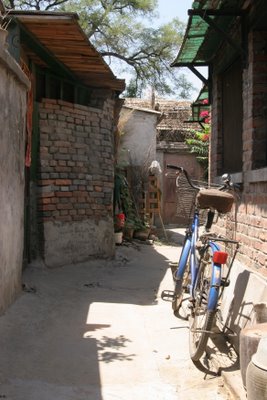TGI...
There's a TGIFriday's where my noodle shop used to be.
Ten years ago I lived in Tianjin, a city of 12 million about a two-hour train ride from Beijing, where I spent a year teaching English at Nankai University. When I returned earlier this year I didn't realize I was outside of campus until the cab stopped. A tastefully designed brick gate had replaced the dilapidated Chinese gate that once stood there. The narrow, tree-lined street clogged with ox-carts, pigs, and bicycles is now a broad, treeless avenue with a fast flowing traffic of cars and taxis. The canal outside the gate, once a gag and retch inducing toxic sludge, now shows signs of life and has lost familiar aroma. The warren of alleys where we bought produce and ate noodles and dumplings has been razed and replaced with apartment blocks, hotels. Where vendors once sold live chickens, and charged a little extra to kill and pluck, TGIFriday's now sells Buffalo wings.

Outside my old apartment at Nankai University. Aparently it doesn't take much to qualify as a Higher Intellectual.
From Tianin we used to go to Beijing at least once a month in search of cheese. The Beijing Friendship Store was the only place we could get it. Again, didn't realize I was anywhere near the Friendship Store until I was on its doorstep. The street it sits on was once lined with traditional houses and was near the beginnings of a large and lively street market. The houses are gone, replaced with upscale apartments and slick shopping malls. The street market has been forced indoors.
Beijing, like Shanghai, is one of China's "Shocase Cities." This is where China shows the world that it has come a long way, baby. The city is going through a forced modernization in preparation for the 2008 Olympics. The old "hutong," narrow alleyways of mud-brick houses and noodle shops that once housed nearly all Beijingers, are being mowed down to make way for modern apartments, malls and offices. The "chai" (condemned) character marks much of the city for demolition.
The remaining hutong preserve a solitude not found elsewhere in the city. Traditional life in Beijing revolved around distinctions between "inner" and "outer." Walking through the old alleys one can sense activity everywhere, but it all happens behind the walls, in the courtyards, away from the prying eyes of those outside.

"Chai" This boutique and the rest of the shops on the block will be demolished to make way for modernity.




Vanishing Beijing: Quiet alleys, airing out shoes, shaving noodles from a loaf of dough, sacked-out delivery man.
Ten years ago I lived in Tianjin, a city of 12 million about a two-hour train ride from Beijing, where I spent a year teaching English at Nankai University. When I returned earlier this year I didn't realize I was outside of campus until the cab stopped. A tastefully designed brick gate had replaced the dilapidated Chinese gate that once stood there. The narrow, tree-lined street clogged with ox-carts, pigs, and bicycles is now a broad, treeless avenue with a fast flowing traffic of cars and taxis. The canal outside the gate, once a gag and retch inducing toxic sludge, now shows signs of life and has lost familiar aroma. The warren of alleys where we bought produce and ate noodles and dumplings has been razed and replaced with apartment blocks, hotels. Where vendors once sold live chickens, and charged a little extra to kill and pluck, TGIFriday's now sells Buffalo wings.

Outside my old apartment at Nankai University. Aparently it doesn't take much to qualify as a Higher Intellectual.
From Tianin we used to go to Beijing at least once a month in search of cheese. The Beijing Friendship Store was the only place we could get it. Again, didn't realize I was anywhere near the Friendship Store until I was on its doorstep. The street it sits on was once lined with traditional houses and was near the beginnings of a large and lively street market. The houses are gone, replaced with upscale apartments and slick shopping malls. The street market has been forced indoors.
Beijing, like Shanghai, is one of China's "Shocase Cities." This is where China shows the world that it has come a long way, baby. The city is going through a forced modernization in preparation for the 2008 Olympics. The old "hutong," narrow alleyways of mud-brick houses and noodle shops that once housed nearly all Beijingers, are being mowed down to make way for modern apartments, malls and offices. The "chai" (condemned) character marks much of the city for demolition.
The remaining hutong preserve a solitude not found elsewhere in the city. Traditional life in Beijing revolved around distinctions between "inner" and "outer." Walking through the old alleys one can sense activity everywhere, but it all happens behind the walls, in the courtyards, away from the prying eyes of those outside.

"Chai" This boutique and the rest of the shops on the block will be demolished to make way for modernity.




Vanishing Beijing: Quiet alleys, airing out shoes, shaving noodles from a loaf of dough, sacked-out delivery man.


0 Comments:
Post a Comment
<< Home